Author: Yuliya
What is the concept of a strategic reserve asset of 1 million BTCs?
According to data from the World Gold Council, as of the third quarter of 2024, the total gold reserves of the Federal Reserve reached 8,133.46 tons (about $530 billion), ranking first in the world. Meanwhile, the current market value of 1 million BTCs is close to $100 billion, accounting for about 19% of the size of the US gold reserves, which is quite considerable in scale.
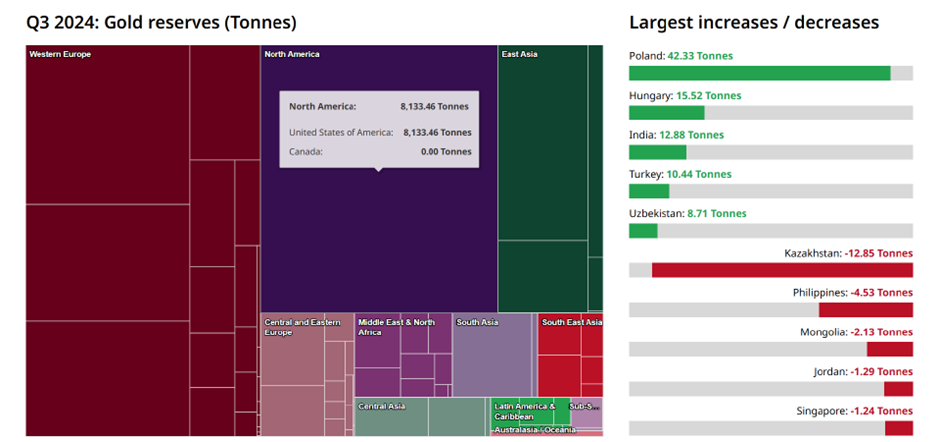
Source: World Gold Council
With Trump and an increasing number of institutions/companies, and sovereign states beginning to consider setting up a "Bitcoin strategic reserve", is Bitcoin's "Fort Knox moment" about to arrive? Can it become an important component of the global reserve asset system like gold?
The next ten years may be the key time window for the answer to be revealed.
What does "strategic reserve asset" mean?
At the Bitcoin2024 conference held in July 2024, Trump clearly promised to "never sell" the Bitcoin held by the government and future acquisitions, and insisted on the concept of "strategic Bitcoin reserve".
With Trump's election and the recent appointment of crypto-friendly figures to key positions such as the US Treasury Secretary, SEC Chair, and White House Crypto Czar, the idea of the US incorporating Bitcoin into its strategic reserves is moving closer to reality.
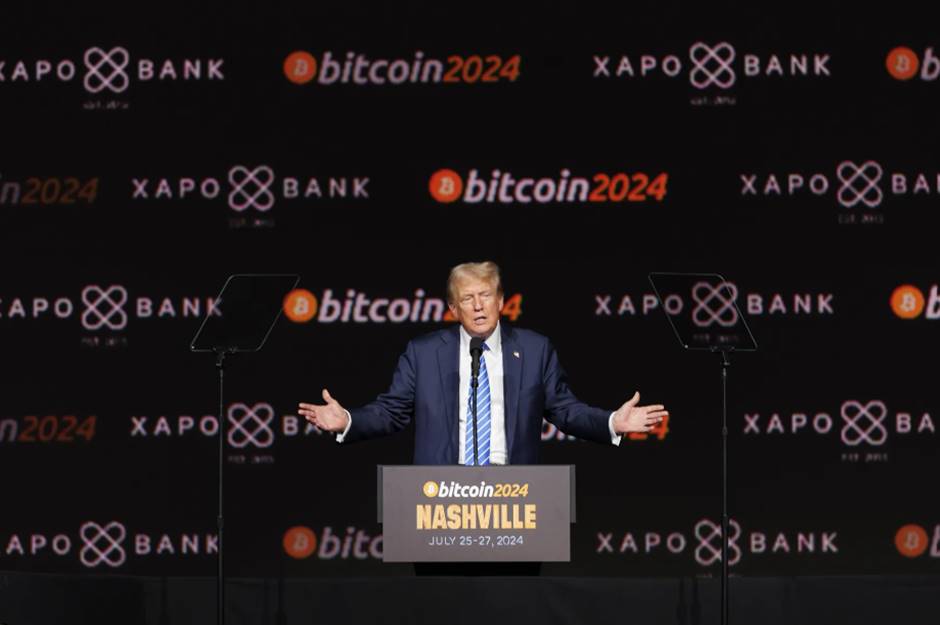
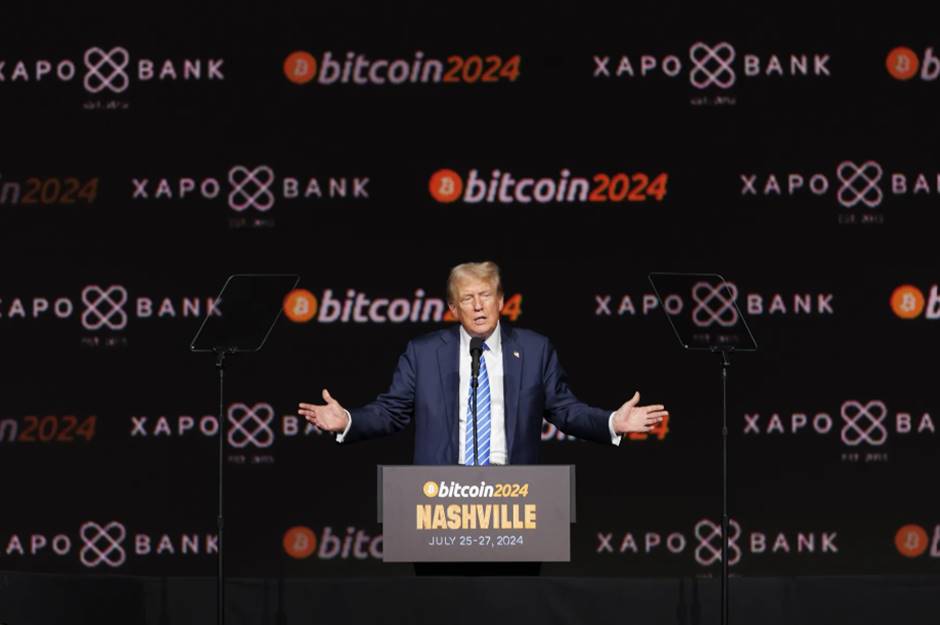
What exactly is a "strategic reserve asset"?
Fundamentally, a "strategic reserve asset" is a key asset held by a national or regional government to address economic fluctuations, financial crises, or geopolitical risks, and to maintain the country's financial stability, economic security, and international competitiveness. Such assets typically have high value and widespread acceptance, safety and stability, and liquidity.
At the corporate level, "strategic reserve assets" help achieve financial stability, enhance risk resistance, and support long-term growth strategies. Especially during economic turmoil, strategic reserve assets often constitute the primary barrier for companies to withstand risks.
Traditional strategic reserve assets mainly include:
Gold: Recognized as a stable value storage tool due to its scarcity and anti-inflation ability;
Foreign exchange reserves: Mainly US dollar-denominated reserve currencies, constituting an important means of supporting international trade and payments;
Special Drawing Rights (SDRs): Allocated by the International Monetary Fund (IMF) to supplement the official reserves of member countries;
As can be seen, assets that can become "strategic reserves" need to have comprehensive advantages such as value stability, global recognition, and convenient circulation. As an emerging digital asset, Bitcoin is gradually meeting these conditions and is beginning to be seen as a potential option beyond gold.
Notably, in addition to Trump's "promise", on July 31, 2024, US Senator Cynthia Lummis submitted the "BITCOIN Act of 2024" to Congress, which explicitly requires the "US Treasury Department to purchase 1 million BTCs within 5 years and hold them for at least 20 years, unless used to repay outstanding federal debt", and plans to require the Federal Reserve to "use a certain amount of net income each year to purchase Bitcoin".
This plan aims to ensure that the US government holds sufficient Bitcoin over the next twenty years, providing the country with a long-term financial hedging tool. The bill has been submitted to the US Senate Banking, Housing, and Urban Affairs Committee and needs to be discussed and voted on. After passing both houses, it will be sent to Trump for signature into law.
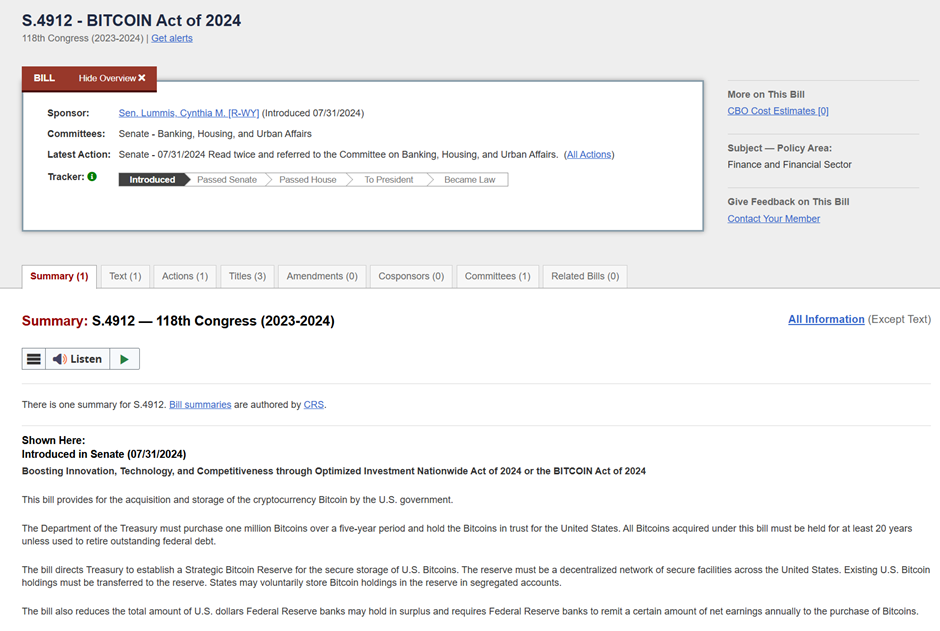
Why Bitcoin, besides gold and foreign exchange?
From an asset allocation perspective, gold reserves are not absolutely the more the better.
The primary consideration is that gold as a physical asset lacks the attribute of interest or income, and its liquidity returns are also not significant. This is the core reason why Buffett has long held a cautious attitude towards it - "gold cannot pay interest, so it lacks the compounding effect".
More crucially, gold reserves require high storage and maintenance costs. For most countries, the effective management and security of gold reserves have become an undeniable fiscal burden. Taking the Federal Reserve's iconic gold vault "Fort Knox" as an example, its security investment can be said to be astonishing:
Located deep in the strategic heartland of the United States in Kentucky, it adopts an underground deep-buried structure, equipped with thick reinforced concrete protective walls and a 24/7 security system, with a military garrison of tens of thousands of people stationed there year-round. This means that gold reserves are not only a security requirement, but have also evolved into a continuous high-asset fiscal expenditure.
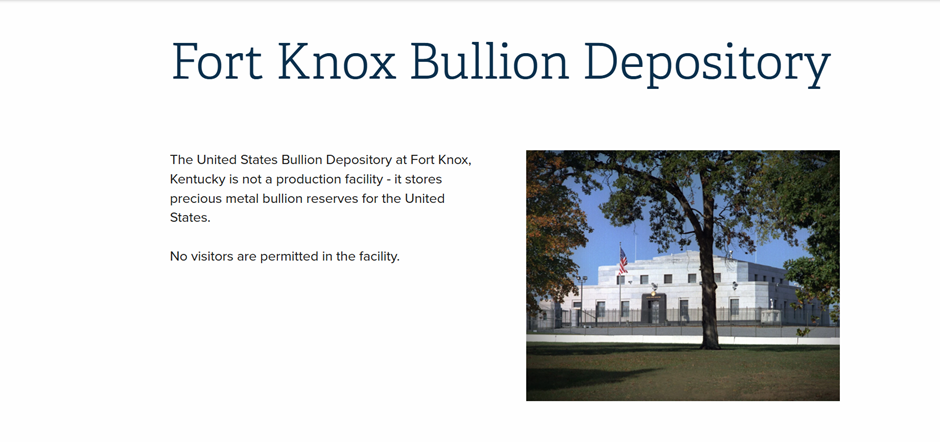
In contrast, the storage cost of Bitcoin is almost negligible. It does not occupy physical space and does not require the installation of expensive protective facilities. It only needs to rely on secure wallets, multi-signature technology, and a decentralized network verification system to achieve efficient storage management.
At the national level, Bitcoin storage expenditures are mainly concentrated on technology and network maintenance, far lower than the physical protection costs of gold. This means that even if Bitcoin does not generate direct income, its holding cost is significantly better than gold, leaving more room for asset net growth.
At the same time, physical gold transactions often involve complex processes such as physical delivery, storage, and transportation, which may take days or even weeks. The gold market is also often constrained by the time and geographical constraints of the traditional financial system, while Bitcoin can be traded 24/7 globally through exchanges.
Besides gold, foreign exchange reserves (such as the Euro, Yen, etc.) as other countries' issued fiat currencies, their value not only depends on the economic conditions of the issuing country, but are also more susceptible to geopolitical risk shocks. Bitcoin, on the other hand, can avoid currency devaluation risks caused by excessive issuance due to its scarcity, and any holder (whether individual, institution, or sovereign state) can freely store, transfer, and trade it globally.
This decentralized feature ensures that Bitcoin is not affected by political and economic interference, and its value storage function can remain stable even in times of global turmoil.
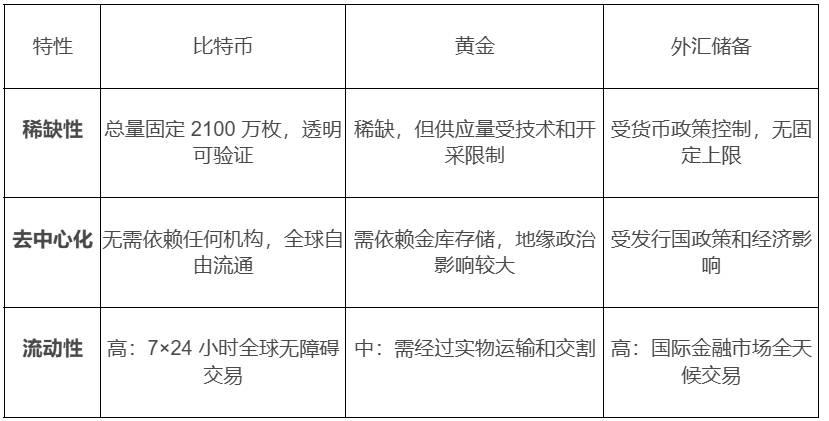

Corporations/Institutions and Sovereign States are Becoming Bitcoin "Pixiu"
The current $2 trillion Bitcoin market, with its features of no need for physical storage, global circulation, high transparency, and anti-inflation, is gradually becoming a potential reserve tool. More and more companies/institutions and even sovereign states are beginning to explore incorporating Bitcoin into their strategic reserve asset systems.
The US Government: One of the Largest Bitcoin Holders in the World
Surprisingly, the US government is one of the largest Bitcoin holders in the world. Over the years, through law enforcement actions, it has seized a large amount of Bitcoin from cybercriminals, money laundering organizations, and Dark Web markets, and currently holds about 200,000 BTCs, with a market value of close to $20 billion.
As the "most crypto-friendly president in US history" (in terms of public statements), during Trump's future 4-year term, whether Bitcoin will be incorporated into the federal reserve asset system remains to be observed. However, it can be foreseen that the Bitcoin held by the US government may bid farewell to the frequent sell-off mode and explore its long-term strategic value instead.

El Salvador: Daily Investment of 1 BTC
As the first country in the world to establish Bitcoin as legal tender, El Salvador enacted the relevant legislation as early as September 7, 2021. It then launched the Chivo digital wallet, pre-loading $30 worth of Bitcoin for each new user, not only integrating Bitcoin into the national economic system, but also demonstrating its firm "Bitcoinization" path.
Whenever the crypto market experiences violent fluctuations, El Salvador's President Nayib Bukele often announces Bitcoin purchases through social media in a timely manner, injecting confidence into the market. Currently, El Salvador maintains a daily BTC purchase of 1 coin, and with the continuous "buy the dips" support, as of December 10, its BTC holdings have reached 5,959.77 coins, with a holding value of about $577 million.
Although this holding scale is not significant globally, as a small economy, its firm Bitcoin strategy is quite demonstrative, providing a unique experimental case for other countries.
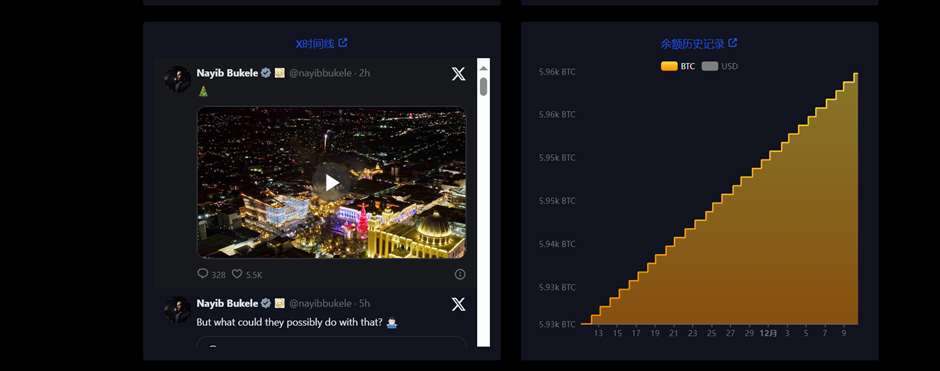
MicroStrategy's All-in on Bitcoin
Outside of sovereign states, the publicly traded company MicroStrategy is undoubtedly a benchmark in the "hoarding Bitcoin" field - its "buy, buy, buy" of Bitcoin has long been a high-profile strategic move, and its holdings exceed the reserves of any sovereign state publicly disclosed.
MicroStrategy's first public Bitcoin purchase can be traced back to August 11, 2020, when it spent $250 million to acquire 21,454 BTC, with an initial cost of about $11,652 per coin. It then launched a continuous accumulation mode, with the most recent purchase on December 9 of about $2.1 billion for 21,550 BTC, at an average price of $98,783 per coin.
As of December 8, 2024, MicroStrategy has cumulatively invested about $25.6 billion to acquire 423,650 BTC, at an average price of about $60,324 per coin. Calculated at the current price of $97,000, the holding has an unrealized profit of about $15.5 billion.
Tesla "Hodling" Bitcoin
On December 20, 2020, following Microstrategy's Michael Saylor's suggestion for other CEOs to follow suit, Elon Musk first expressed interest in buying Bitcoin. In late January 2021, Musk changed his Twitter bio to "#Bitcoin", and Tesla subsequently announced the purchase of $1.5 billion in Bitcoin in February 2021.
Tesla sold 10% of its Bitcoin holdings in the first quarter of 2021, which Musk explained was to "test liquidity and validate Bitcoin's feasibility as a cash alternative on the balance sheet".
According to Arkham data, as of the time of writing, Tesla holds 11,509 BTC, with a holding value of about $1.1 billion.

Other Countries and Mainstream Enterprises/Institutions: Bitcoin Reserves Heading Towards Mainstream
The strategic value of Bitcoin is penetrating from the national level to the corporate and institutional level. National reserve deployments directly impact the policy environment, while enterprises are the core driving force of adoption. Bitcoin has become not only a hedge, but a key strategic component of corporate balance sheets.
Recently, tech giants like Microsoft and Amazon have received positive shareholder initiatives, calling for the inclusion of Bitcoin in their balance sheets.
MicroStrategy founder Michael Saylor has proposed Bitcoin investment advice to Microsoft's board of directors, believing this would significantly increase corporate value and create long-term shareholder returns.
At the same time, the American conservative think tank National Center for Public Policy Research has advised Amazon to allocate 1% of its total assets to Bitcoin, to enhance shareholder value and hedge against fiat devaluation risks.
The inclusion of Bitcoin in the balance sheets of mainstream institutions and traditional enterprises can bring the following advantages:
Inflation resistance: The scarcity of 21 million BTC endows Bitcoin with strong anti-inflation properties, helping enterprises stabilize asset values in the global monetary easing environment;
Diversified investment portfolio: As a new asset class, Bitcoin enriches the asset allocation dimensions of enterprises, reducing single-asset dependence and enhancing financial resilience;
Enhance corporate brand and market image: Holding Bitcoin demonstrates a company's embrace of innovative technology and future economic models, enhancing market competitiveness and shaping a forward-looking brand image;
However, in the process of incorporating BTC into the balance sheet, enterprises need to solve two key issues: how to safely custody large-scale assets, and how to efficiently execute OTC (over-the-counter) transactions to avoid market impact. This has led to the thriving development of professional custody and OTC services to meet the strict digital asset management requirements of enterprises.
It is worth noting that as the market evolves, the digital asset service ecosystem is also constantly improving. In the custody field, many platforms have begun to adopt independent wallet design and bankruptcy isolation mechanisms, and have introduced insurance coverage to address various risks. For example, the licensed Hong Kong exchange OSL has collaborated with insurers like Canopius to extend the coverage to cybersecurity, technical failures, and other dimensions. Meanwhile, in OTC trading, as a licensed compliant platform, through integration with the traditional banking system, it is providing institutional investors with a more standardized and efficient trading environment.
Bitcoin in the Next Decade: Speculative Asset or Global Strategic Reserve?
Bitcoin has risen from a fringe asset to a new contender for global strategic reserves. From sovereign states to mainstream institutions/traditional enterprises, more and more forces are redefining its role. Its scarcity, decentralized nature, and high transparency have earned it the title of "digital gold".
Although price volatility remains controversial, Bitcoin's adoption is progressing unstoppably. If Trump's "strategic reserve asset" concept is realized, BTC's status will directly challenge gold, and its strategic significance may even surpass gold:
While gold has physical scarcity, its distribution and trading rely on a complex logistics and regulatory system. Bitcoin, powered by blockchain technology, requires no physical storage or transportation, enabling borderless rapid circulation, making it more suitable as a national and institutional reserve asset to undertake more strategic responsibilities. This advantage has also driven professional service providers like OSL to continuously improve their infrastructure, creating one-stop solutions from custody to trading for institutional-grade clients.
In the next decade, the potential of Bitcoin as a global strategic reserve asset will be fully unleashed, and its application scenarios are expected to further expand. From national-level "long-term hoarding" to corporate/institutional "buy and hold", Bitcoin's influence continues to expand. Global leaders and top companies like MicroStrategy, Microsoft, and Amazon have become the best Bitcoin advocates, greatly enhancing global market acceptance of cryptocurrencies.
"The light boat has crossed the mountain." Regardless of whether Bitcoin can become a strategic reserve asset for the US or other countries in the next 4 years, it has won a critical victory in the adoption journey. As more institutions allocate to Bitcoin, the construction of professional digital asset financial infrastructure will play an increasingly crucial role in the future.








